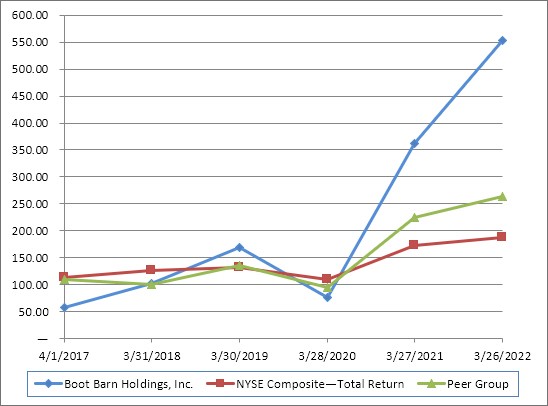The performance share units granted are stock-based awards in which the number of shares ultimately received depends on the Company's performance against its cumulative earnings per share target over a three-year performance period beginning March 31, 2019 and ending March 26, 2022. These performance metrics were established by the Company at the beginning of the performance period. At the end of the performance period, the number of performance shares to be issued is fixed based upon the degree of achievement of the performance goals. If the cumulative three-year performance goals are below the threshold level, the number of performance units to vest will be 0%, if the performance goals are at the threshold level, the number of performance units to vest will be 50% of the target amounts, if the performance goals are at the target level, the number of performance units to vest will be 100% of the target amounts, and if the performance goals are at the maximum level, the number of performance units to vest will be 200% of the target amounts, each subject to continued service by the applicable award recipient through the last day of the performance period (subject to certain exceptions). If performance is between threshold and target goals or between target and maximum goals, the number of performance units to vest will be determined by linear interpolation. The number of shares ultimately issued can range from 0% to 200% of the participant's target award. Based on the Company’s results during the performance period, 200% of the share target amounts vested subsequent to March 26, 2022.
The grant date fair value of the performance share units granted during fiscal 2020 was initially measured using the Company's closing stock price on the date of grant with the resulting stock compensation expense recognized on a straight-line basis over the three-year vesting period. The expense recognized over the vesting period is adjusted up or down on a quarterly basis based on the anticipated performance level during the performance period. If the performance metrics are not probable of achievement during the performance period, stock compensation expense would be reversed. The awards are forfeited if the threshold performance goals are not achieved as of the end of the performance period.
Stock-Based Compensation Expense
Stock-based compensation expense was $9.5 million, $7.2 million, and $4.9 million for fiscal 2022, 2021, and 2020, respectively. Stock-based compensation expense of $2.6 million, $1.2 million, and $0.9 million was recorded in cost of goods sold in the consolidated statements of operations for fiscal 2022, 2021, and 2020, respectively. All other stock-based compensation expense is included in selling, general and administrative expenses in the consolidated statements of operations.
As of March 26, 2022, there was $2.1 million of total unrecognized stock-based compensation expense related to unvested stock options, with a weighted-average remaining recognition period of 1.60 years. As of March 26, 2022, there was $4.6 million of total unrecognized stock-based compensation expense related to restricted stock units, with a weighted-average remaining recognition period of 2.54 years. As of March 26, 2022, there was $2.3 million of total unrecognized stock-based compensation expense related to performance share units, with a weighted-average remaining recognition period of 2.01 years.
10. Commitments and Contingencies
The Company is involved, from time to time, in litigation that is incidental to its business. The Company has reviewed these matters to determine if reserves are required for losses that are probable and reasonable to estimate in accordance with FASB ASC Topic 450, Contingencies. The Company evaluates such reserves, if any, based upon several criteria, including the merits of each claim, settlement discussions and advice from outside legal counsel, as well as indemnification of amounts expended by the Company’s insurers or others, if any.
On May 8, 2019, Sheplers, Inc., a wholly-owned subsidiary of the Company (now known as Sheplers, LLC), was named as defendant in a class-action complaint filed in the Superior Court of California, County of Los Angeles. Among other things, the complaint generally alleges deceptive pricing on merchandise sold in Sheplers’ e-commerce site. The estimated cost of the matter has been accrued as of March 26, 2022.
On February 27, 2020, one employee, on behalf of themself and all other similarly situated employees, filed a class action lawsuit against the Company, which includes claims for penalties under California’s Private Attorney General Act, in the Sacramento County Superior Court, Case No. 37-2019-00272000-CU-OE-GDS, alleging violations
